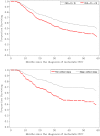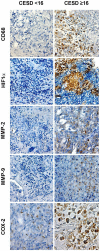Depressive symptoms and cortisol rhythmicity predict survival in patients with renal cell carcinoma: role of inflammatory signaling
- PMID: 22870317
- PMCID: PMC3409855
- DOI: 10.1371/journal.pone.0042324
Depressive symptoms and cortisol rhythmicity predict survival in patients with renal cell carcinoma: role of inflammatory signaling
Abstract
Purpose: Evidence has supported the association between psychological factors and cancer biology; however, findings are equivocal on the role of psychosocial factors in cancer progression. This study generates a hypothesis of mechanistic variables by examining the clinical effects of psychosocial factors and cortisol dysregulation in patients with metastatic renal cell carcinoma (RCC) and examines associated activation of transcription control pathways.
Methods: Patients with metastatic RCC (n = 217) were prospectively enrolled in this study. Patients completed questionnaires (Centers for Epidemiologic Studies-Depression; SF-36 Health Status Survey; Duke Social Support Index; Coping Operations Preference Enquiry; organized and non-organized religious activity; and intrinsic religiosity), and provided blood and saliva samples. Cortisol levels and whole genome transcriptional profiling were assessed to identify potential alterations in circadian rhythms and genomic pathways.
Results: Separate Cox regression models, controlling for disease risk category, revealed that CES-D scores (p = 0.05, HR = 1.5, 95% CI for HR: 1.00-2.23) and cortisol slope (p = 0.002; HR = 1.9; 95%CI for HR: 1.27-2.97) were significantly associated with decreased survival. Only cortisol slope and risk category remained significant in the complete model. Functional genomic analyses linked depressive symptoms to increased expression of pro-inflammatory and pro-metastatic genes in circulating leukocytes. 116 transcripts were found to be upregulated by an average of 50% or more in high CES-D patients, and 57 transcripts downregulated by at least 50%. These changes were also found in the tumor in a subset of patients.
Conclusion: These findings identify depressive symptoms as a key predictor of survival in renal cell carcinoma patients with potential links to dysregulation of cortisol and inflammatory biology.
Conflict of interest statement
Figures



References
-
- Thaker PH, Han LY, Kamat AA, Arevalo JM, Takahashi R, et al. (2006) Chronic stress promotes tumor growth and angiogenesis in a mouse model of ovarian carcinoma. Nat Med 12: 939–944. - PubMed
-
- Reiche EM, Morimoto HK, Nunes SM (2005) Stress and depression-induced immune dysfunction: implications for the development and progression of cancer. Int Rev Psychiatry 17: 515–527. - PubMed
-
- Jehn CF, Kuehnhardt D, Bartholomae A, Pfeiffer S, Krebs M, et al. (2006) Biomarkers of depression in cancer patients. Cancer 107: 2723–2729. - PubMed
Publication types
MeSH terms
Substances
Grants and funding
LinkOut - more resources
Full Text Sources
Medical
Molecular Biology Databases

